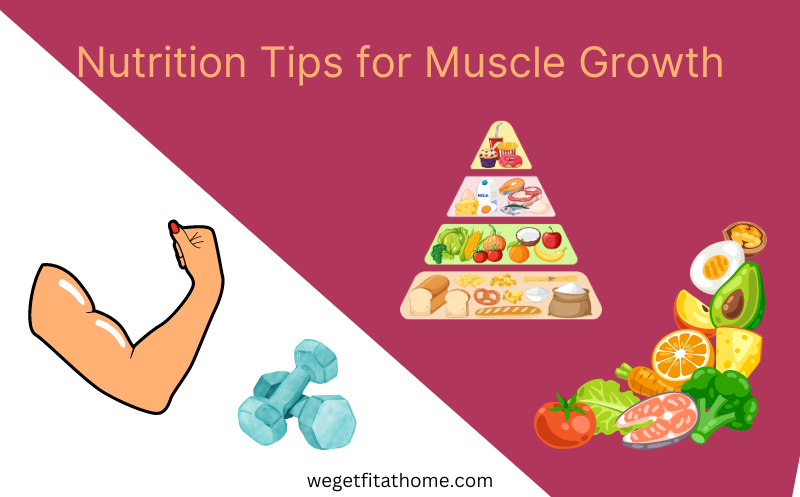Achieving muscle gain isn’t just about lifting weights or doing exercises; it also depends a lot on what you eat. Nutrition is a key part of building strong muscles and staying healthy. In this post, we’ll share some easy-to-follow nutrition tips for muscle growth to help you reach your fitness goals. By making small changes to your diet and being consistent, you’ll start seeing results in no time!
Best Nutrition Tips for Muscle Growth
Building muscle requires a combination of healthy eating habits. Here are the best foods and nutrients to focus on:
1-Protein – The Building Block for Muscles
To build muscle, you need protein. Protein helps repair and grow your muscles after a workout. Plant-based proteins are one nutrition tip for muscle growth. From football stars to tennis pros, more and more athletes are going plant-based to fuel their sporting success. Aim to include protein in every meal. Here are some great options:
- Plant-based options such as grains, legumes, pulses, nuts, and seeds.
- Lean meats like chicken, turkey, and fish
- Eggs and dairy products like yogurt and cottage cheese
A high-protein diet for muscle gain is important for success. You can even consider adding a protein supplement like whey protein to ensure you’re getting enough.
2-Carbs – Fuel for Your Workouts
Carbohydrates (carbs) give you energy for your workouts and help you recover afterward. Try to include healthy carbs like:
- Whole grains (oats, brown rice, quinoa)
- Vegetables and fruits
- Sweet potatoes and beans
Eating the right amount of carbs for muscle gain will help fuel your body and keep your energy levels up during exercise.
3-Healthy Fats – Supporting Hormones
Fats are often overlooked, but they play a vital role in muscle-building nutrition. Healthy fats support hormone production, including testosterone, which helps muscle growth. Include sources of good fats like:
- Olive oil, nuts, and seeds
- Avocados
- Fatty fish, like salmon or mackerel
Effective Nutrition Strategies for Muscle Gain
Eating right is only part of the puzzle. When and how you eat can also make a difference in your muscle gain.
Timing Your Meals
Eating the right foods at the right time helps maximize your muscle growth. For example:
- Before a workout: Eat a small meal with protein and carbs to give you energy.
- After a workout: Have a meal or snack with protein and carbs within 30-60 minutes to help your muscles recover.
By following these nutrition tips for building muscle, you’ll make sure your body is fueled for exercise and recovery.
Supplements to Consider
Some people find supplements helpful, when used in moderation, when they are trying to build muscle. Here are a few you might consider:
- Protein powder: A fast-digesting protein that helps muscle recovery.
- Creatine in moderation: Supports short bursts of energy during strength training.
- BCAAs (Branched-Chain Amino Acids): Help with muscle repair and reduce soreness.
Diet for Muscle Gain
To build muscle as you workout, your body needs more calories than it burns. This is called a calorie surplus. But it’s important to choose nutrient-rich foods, not junk food, to gain healthy muscle, not fat. Here’s how you can create a balanced diet for muscle gain:
Include Balanced Meals
Make sure each meal includes:
- A good source of protein (chicken, fish, tofu)
- Healthy carbs (brown rice, quinoa, sweet potatoes)
- Healthy fats (olive oil, avocados, nuts)
Eating balanced meals throughout the day will give your body the energy and nutrients it needs for muscle growth.
Nutritional Requirements for Muscle Growth
Macronutrients – Protein, Carbs, and Fats
A simple guide for your diet could be:
- 30% protein
- 50% carbs
- 20% fats
This helps ensure that you’re getting enough of each nutrient to build muscle effectively.
Micronutrients – Vitamins and Minerals
In addition to macronutrients, certain vitamins and minerals help your muscles recover and grow. Some important ones include:
- Vitamin D: Supports muscle function.
- Magnesium: Helps relax muscles and prevents cramps.
- Zinc: Plays a role in protein synthesis, which helps build muscle.
Nutrition Tips for Muscle Growth
Building muscle takes time, but with the right nutrition and a bit of patience, you’ll get there. Remember, nutrition is just as important as your workouts. By following these muscle gain tips, you’re giving your body the fuel it needs to grow strong.
And don’t forget, there’s a simple saying: “If you don’t use it, you will lose it.” Muscles need regular use to stay strong, so along with good nutrition, stay active. Whether it’s walking, lifting weights, or doing yoga – keeping your muscles in motion will help you maintain your strength and health as you age.
Stay committed, eat well, and keep moving to see the results you want!
Disclaimer: If you have any concerns or questions about your health, you should always consult with a physician or other healthcare professional. No content on this site should be substituted for direct medical advice from your doctor or other qualified healthcare practitioners. The information contained here is for informational purposes only. It is from my research and personal experience.
Related Posts
10 Tips for Gaining Muscle Mass After 50
Top 15 Benefits of Strength Training
8 Benefits of Strong Core Muscles
How Can You Prevent Muscle Loss as You Age?

